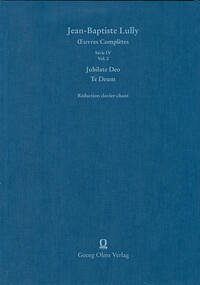Der auf der Partitur der historisch-kritischen Gesamtausgabe fußende Klavierauszug des "Te Deum" und des "Jubilate Deo" dient der praktischen Umsetzung dieser beiden Motetten. Sie wurden am Hofe Ludwigs des XIV. für geistliche Anlässe komponiert und bieten mit ihrer doppelchörigen Anlage Möglichkeiten sowohl für glanzvolle, als auch für kleiner besetzte Aufführungen. Der Klavierauszug ist mit einer Einführung in die Werke in französicher, englischer und deutscher Sprache versehen. Der in Florenz geborene Jean-Baptiste Lully (1632-1687) ist der bedeutendste französische Komponist des 17. Jahrhunderts, dessen Einfluss in Europa auf Komponisten wie Purcel, Bach und Händel bedeutend war. Mit seinen fünfzehn Opern, deren meiste Libretti Philippe Quinault schrieb, schuf er ein bis ins 20. Jahrhundert nachwirkendes Modell für das französische Musiktheater. Als Tänzer und Komponist trat er 1653 in den Dienst Ludwigs des XIV., des mächtigsten Monarchen der Epoche, für dessen Feste er "Ballets de cour" und zusammen mit Molière seine berühmten "Comédies-ballets" schuf. Unter den kirchenmusikalischen Werken ragen das "Te Deum", das "Miserere" und das "De profundis" heraus. *** The piano transcriptions of the "Te Deum" and "Jubilate Deo", based on the score as given in the historical-critical complete works, is intended to assist in the transposition of both motets. They were composed for religious purposes at the court of Louis XIV and the composition for double chorus offers possibilities for both large and small performances. The piano score includes an introduction in French, English and German. Jean-Baptiste Lully (1632-1687) was the most important French composer of the 17th century, whose influence in Europe and on composers such as Purcell, Bach and Handel was considerable. With his 15 operas, most of them based on libretti by Philippe Quinault, Lully created a model for French musical theatre. In 1653, as a dancer and composer, he entered the service of Louis XIV, the most powerful monarch of the time, for whose Court he wrote ballets de cour and, in conjunction with Moliere, several comedie-ballets. The demand for Lully scores and performance material has increased considerably in recent years. This new edition will be the first historical-critical edition, based on a study of all surviving sources. As well as full scores, each of which will include a printout of the libretto whre appropriate, performance material and piano scores of the dramatic works and the sacred music will also be published. The guidelines of this edition meet the requirements of modern philology and of performance practice, while text revision will be the responsibility of established literary experts.
Bitte wählen Sie Ihr Anliegen aus.
Rechnungen
Retourenschein anfordern
Bestellstatus
Storno

